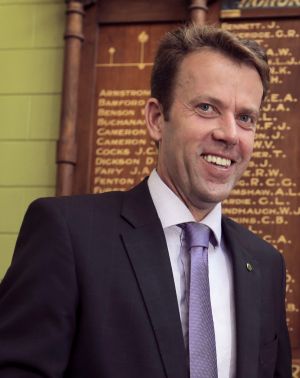
Liberal MP Dan Tehan Photo: Rob Gunstone
Prime Minister Tony Abbott is facing a renewed push from within his own ranks to have the GST apply to fresh food, health and education, with one backbencher declaring it “unfinished business”.
Prominent country Liberal MP Dan Tehan says the government must begin 2015 where former treasurer Peter Costello left off “by broadening the GST”.
The 10 per cent Goods and Services Tax only applies to some food because of the deal the Howard government struck with the Australian Democrats in 2000.
In an opinion piece in the Australian Financial Review, Mr Tehan says without tax reform “we will hand a bound and broken Australia to our children”.
“The Coalition knows this and has included the GST as part of its tax white paper,” Mr Tehan wrote.
Mr Tehan says broadening the base could raise $22 billion each year, which he says would “enable further serious reductions in indirect taxes”.
He argues changes should be taken to the next election.
Mr Abbott, as opposition leader, said on election-eve that there would be “no change to the GST” in his infamous interview with the SBS. In the same interview he also pledged there would be no cuts to the ABC – a promise he admits he has broken.
But since then, the Prime Minister has said the GST will be examined in the taxation and federation white papers, which are both due before the 2016 election.
Further, Finance Minister Mathias Cormann has ruled out applying the GST to food but only in this term, cementing the view that government may take a GST package to the 2016 election.
But the new Assistant Treasurer Josh Frydenberg has flagged his intention to close a loophole in which Australians buying goods from overseas websites worth up to $1000 are not required to pay the GST. This measure could be introduced in the government’s current term but would depend on whether the states and federal Parliament agreed.
Labor opposed the original GST and is against any further expansion because the opposition says it is a “regressive tax”, meaning it disproportionately hurts the poor and those on low-income.
But Mr Tehan told Fairfax Media that the alternative is to have a tax system that stifles growth through direct taxes like income and company charges, which he said leads to the “whole tax system becoming regressive”.
